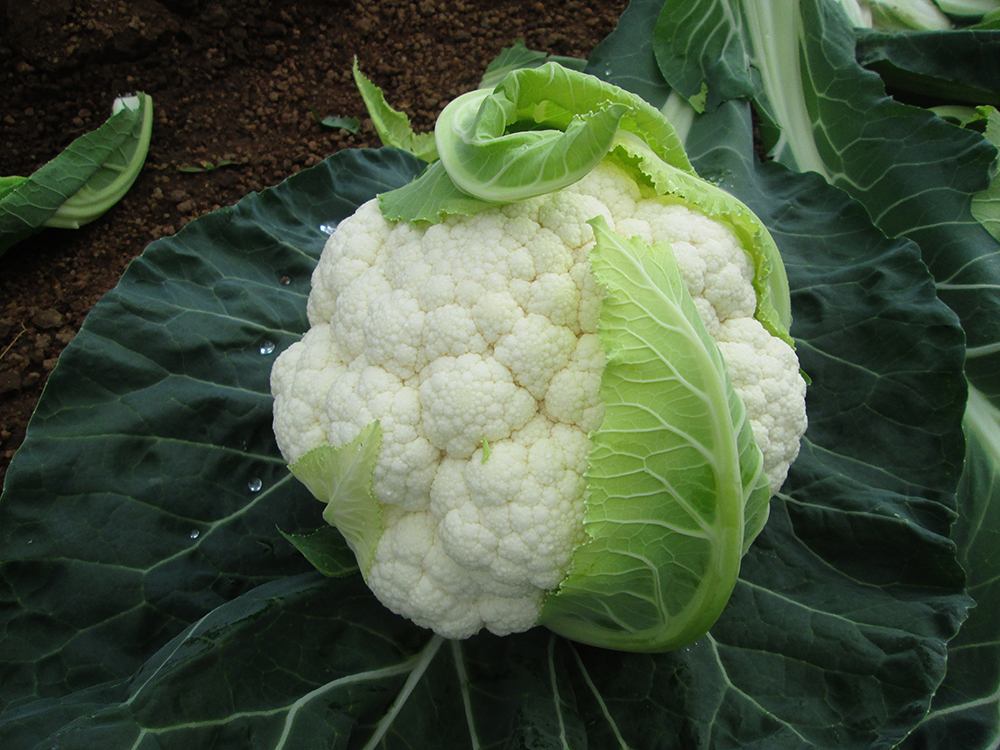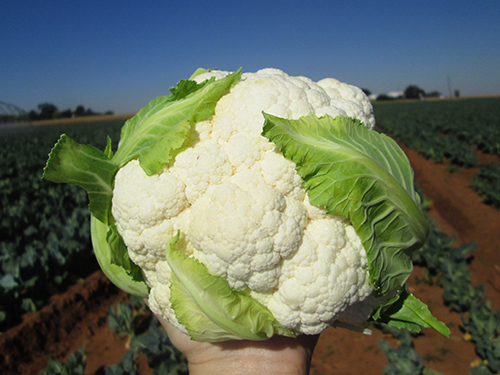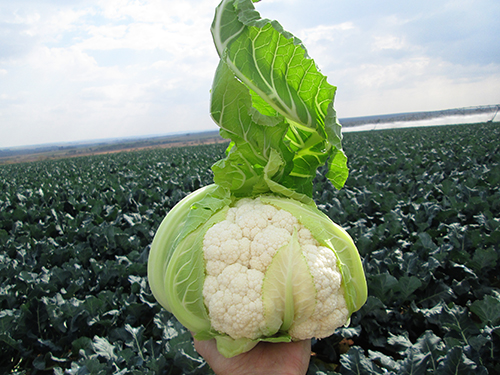
The Cruciferae family is made up of numerous crops with those that are commercially important belonging to the genus Brassica and hence are commonly known as the Brassicas. Brassica crops include cabbage, cauliflower, broccoli, sprouting broccoli and brussels sprouts, are very closely related and all belong to the same botanical species Brassica oleracea. Cauliflower (Brassica oleracea L. var. botrytis) production, in particular, increased in recent years due to growing demand from health-conscious consumers. Cauliflower is naturally high in fibre and essential B-vitamins and provides antioxidants and phytonutrients to the diet. The growing demand for this versatile vegetable is mostly due to cauliflower being the preferred alternative to flour in gluten-free recipes and a replacement for starch.
Although farmers can expect an increase in demand, producing high quality cauliflower can be challenging in South Africa due to high temperatures. To meet South African market requirements, cauliflower heads should be compact, crisp with a fresh white colour free from brown spots and other discolourations. Through extensive research SAKATA was able to develop varieties that are adapted to the extreme summer temperatures in South Africa. These varieties have vigorous plants with excellent wrapper leaves protecting the fleshy, white curds from sunburn and other environmental factors and were specifically selected for South Africa. Physical damage due to handling during harvest is also reduced due to wrapper leaves that are firmly folded around the curds.
Twister* is the latest addition to the Sakata cauliflower range. Chosen for its exceptional wrap, this variety can withstand extreme heat. In mild climatic conditions, it can be used for year-round production. Physical damage to the curd is minimized due to wrapper leaves protecting the white, uniform curds during handling and transportation of the product. Twister* produces large white curds with a good dome shape, perfectly suited to both pre-pack and processing requirements.


The importance of proper handling during harvest as well as post-harvest practices of cauliflower are easily overlooked. It has been shown that post-harvest handling is the weakest link in the production-marketing continuum for agricultural produce. Since cauliflower curds spoil rapidly due to their high moisture content and delicate nature, losses occur, both in terms of quantity and quality. Efforts to enhance handling practices can be a low cost, high impact solution for improving the quality and shelf-life of fresh produce.
During manual harvest, the curds should not be touched by hand or with the harvesting tool to minimize physical damage. The curd is harvested by cutting the stem to leave the wrapper leaves still attached to protect to curds during transportation in plastic crates or bins. Since curds consist of 90% water, cauliflower is very sensitive to moisture loss. Curds should be firm and tight during harvest as more than 5% weight loss due to dehydration can leave cauliflower heads noticeably soft and unacceptable for the market place. This can be avoided by harvesting in the morning or late afternoon and ensuring rapid cooling and packaging of product for maximised yield and quality.
*Experimental: This variety does not appear on the current South African Variety list, but has been submitted for registration.
Article by Sakata Seeds
DISCLAIMER: This information is based on our observations and/or information from other sources. As crop performance depends on the interaction between the genetic potential of the seed, its physiological characteristics, and the environment, including management, we give no warranty express or implied, for the performance of crops relative to the information given nor do we accept any liability for any loss, direct or consequential, that may arise from whatsoever cause. Please read the Sakata Seed Southern Africa (Pty) Ltd Conditions of Sale before ordering seed.
| Cookie | Duration | Description |
|---|---|---|
| cookielawinfo-checkbox-analytics | 11 months | This cookie is set by GDPR Cookie Consent plugin. The cookie is used to store the user consent for the cookies in the category "Analytics". |
| cookielawinfo-checkbox-functional | 11 months | The cookie is set by GDPR cookie consent to record the user consent for the cookies in the category "Functional". |
| cookielawinfo-checkbox-necessary | 11 months | This cookie is set by GDPR Cookie Consent plugin. The cookies is used to store the user consent for the cookies in the category "Necessary". |
| cookielawinfo-checkbox-others | 11 months | This cookie is set by GDPR Cookie Consent plugin. The cookie is used to store the user consent for the cookies in the category "Other. |
| cookielawinfo-checkbox-performance | 11 months | This cookie is set by GDPR Cookie Consent plugin. The cookie is used to store the user consent for the cookies in the category "Performance". |
| viewed_cookie_policy | 11 months | The cookie is set by the GDPR Cookie Consent plugin and is used to store whether or not user has consented to the use of cookies. It does not store any personal data. |